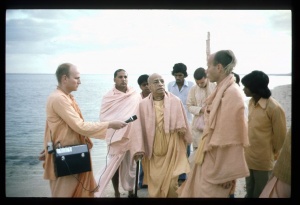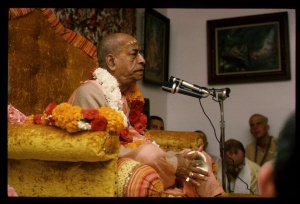SB 3.4.16

A.C. Bhaktivedanta Swami Prabhupada
TEXT 16
karmāṇy anīhasya bhavo 'bhavasya te
durgāśrayo 'thāri-bhayāt palāyanam
kālātmano yat pramadā-yutāśramaḥ
svātman-rateḥ khidyati dhīr vidām iha
SYNONYMS
karmāṇi—activities; anīhasya—of one who has no desire; bhavaḥ—birth; abhavasya—of one who is never born; te—your; durga-āśrayaḥ—taking shelter of the fort; atha—thereafter; ari-bhayāt—out of fear of the enemies; palāyanam—flee; kāla-ātmanaḥ—of He who is the controller of eternal time; yat—that; pramadā-āyuta—in the association of women; āśramaḥ—household life; sva-ātman—in Your own Self; rateḥ—one who enjoys; khidyati—is disturbed; dhīḥ—intelligence; vidām—of the learned; iha—in this world.
TRANSLATION
My Lord, even the learned sages become disturbed in their intelligence when they see that Your Greatness engages in fruitive work although You are free from all desires, that You take birth although You are unborn, that You flee out of fear of the enemy and take shelter in a fort although You are the controller of invincible time, and that You enjoy householder life surrounded by many women although You enjoy in Your Self.
PURPORT
Pure devotees of the Lord are not very much concerned with philosophical speculation in regard to transcendental knowledge of the Lord. Nor is it possible to acquire complete knowledge of the Lord. Whatever little knowledge they have about the Lord is sufficient for them because devotees are simply satisfied in hearing and chanting about the transcendental pastimes of the Lord. This gives them all transcendental bliss. But some of the pastimes of the Lord appear contradictory, even to such pure devotees, and thus Uddhava asked the Lord about some of the contradictory incidents in His pastimes. The Lord is described as having nothing to do personally, and it is actually so because even in the creation and sustenance of the material world, the Lord has nothing to do. It seems contradictory, then, to hear that the Lord personally lifts the Govardhana Hill for the protection of His unalloyed devotees. The Lord is the Supreme Brahman, the Absolute Truth, the Personality of Godhead appearing like a man, but Uddhava had doubts whether He could have so many transcendental activities.
There is no difference between the Personality of Godhead and the impersonal Brahman. How then can the Lord have so many things to do, whereas the impersonal Brahman is stated to have nothing to do either materially or spiritually? If the Lord is ever unborn, how then is He born as the son of Vasudeva and Devakī? He is fearful even to kāla, the supreme fear, and yet the Lord is afraid of fighting Jarāsandha and takes shelter in a fort. How can one who is full in Himself take pleasure in the association of many women? How can He take wives and, just like a householder, take pleasure in the association of family members, children, relatives and parents? All these apparently contradictory happenings bewilder even the greatest learned scholars, who, thus bewildered, cannot understand whether inactivity is a fact or whether His activities are only imitations.
The solution is that the Lord has nothing to do with anything mundane. All His activities are transcendental. This cannot be understood by the mundane speculators. For the mundane speculators there is certainly a kind of bewilderment, but for the transcendental devotees there is nothing astonishing in this. The Brahman conception of the Absolute Truth is certainly the negation of all mundane activities, but the Parabrahman conception is full with transcendental activities. One who knows the distinctions between the conception of Brahman and the conception of Supreme Brahman is certainly the real transcendentalist. There is no bewilderment for such transcendentalists. The Lord Himself also declares in Bhagavad-gītā (BG 10.2), "Even the great sages and demigods can know hardly anything about My activities and transcendental potencies." The right explanation of the Lord's activities is given by Grandfather Bhīṣmadeva (SB 1.9.16) as follows:
- na hy asya karhicid rājan
- pumān veda vidhitsitam
- yad-vijijñāsayā yuktā
- muhyanti kavayo 'pi hi
SB 3.4.17
2008-03-16T18:10:01Z
Acyuta
2

A.C. Bhaktivedanta Swami Prabhupada
TEXT 17
mantreṣu māṁ vā upahūya yat tvam
akuṇṭhitākhaṇḍa-sadātma-bodhaḥ
pṛccheḥ prabho mugdha ivāpramattas
tan no mano mohayatīva deva
SYNONYMS
mantreṣu—in consultations; mām—unto me; vai—as either; upahūya—by calling; yat—as much as; tvam—Your Lordship; akuṇṭhita—without hesitation; akhaṇḍa—without being separated; sadā—eternally; ātma—self; bodhaḥ—intelligent; pṛccheḥ—asked; prabho—O my Lord; mugdhaḥ—bewildered; iva—as if it were so; apramattaḥ—although never bewildered; tat—that; naḥ—our; manaḥ—mind; mohayati—bewilders; iva—as it is so; deva—O my Lord.
TRANSLATION
O my Lord, Your eternal Self is never divided by the influence of time, and there is no limitation to Your perfect knowledge. Thus You were sufficiently able to consult with Yourself, yet You called upon me for consultation, as if bewildered, although You are never bewildered. And this act of Yours bewilders me.
PURPORT
Uddhava was never actually bewildered, but he says that all these contradictions appear to be bewildering. The whole discussion between Kṛṣṇa and Uddhava was meant for the benefit of Maitreya, who was sitting nearby. The Lord used to call Uddhava for consultation when the city was attacked by Jarāsandha and others and when He executed great sacrifices as part of His routine royal work as Lord of Dvārakā. The Lord has no past, present and future because He is unhampered by the influence of eternal time and thus nothing is hidden from Him. He is eternally self-intelligent. Therefore His calling for Uddhava to give Him enlightenment is certainly astonishing. All these actions of the Lord appear to be contradictory, although there is no contradiction in the routine activities of the Lord. Therefore it is better to see them as they are and not attempt to explain them.